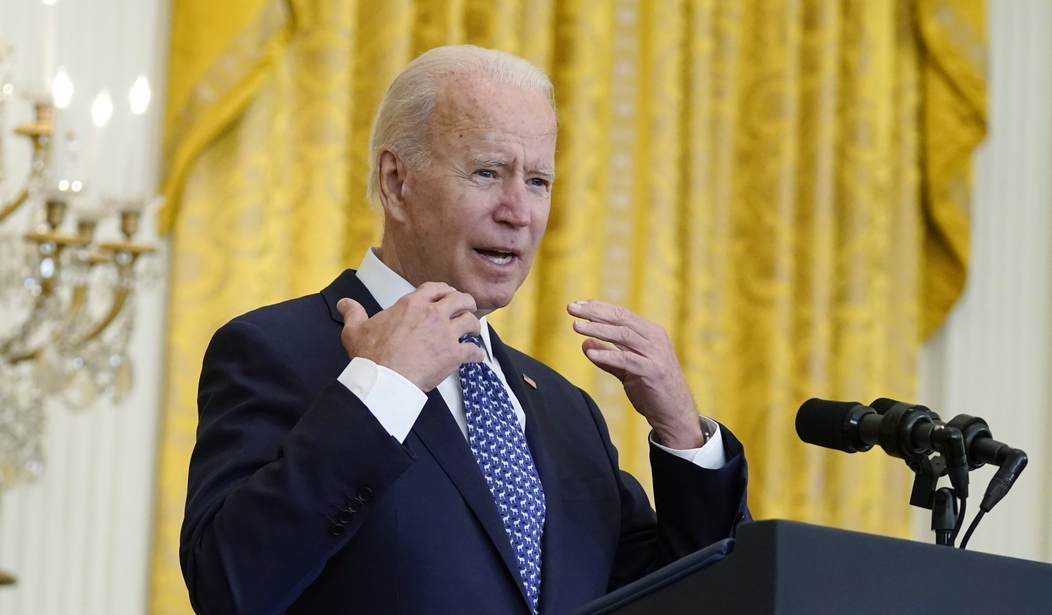At first, this looked like a report on what appears to be an ad hoc strike against vaccine mandates taking place the past few days. Actually, the surprising spike in workers walking off the job started in August, before Joe Biden changed his mind on vaccine mandates, but smack in the middle of a global supply-chain crisis. CNBC reports that the level of walk-offs hit a record high that month, and may portend even more problems down the line:
Job openings declined sharply in August while hiring also fell and the level of workers quitting their jobs hit the highest level since at least late 2000, the Labor Department reported Tuesday.
Employment vacancies fell to 10.44 million during the month, a drop of 659,000 from July’s upwardly revised 11.1 million, according to the department’s Job Openings and Labor Turnover Survey. Federal Reserve officials watch the JOLTS report closely for signs of slack in the labor market. …
However, quits hit a new series high going back to December 2000, as 4.3 million workers left their jobs. The rate rose to 2.9%, an increase of 242,000 from a month ago. Quits are seen as a level of confidence from workers who feel they are secure in finding employment elsewhere.
A total of 892,000 workers in the food service and accommodation industries left their jobs, while 721,000 retail workers departed along with 534,000 in health care and social assistance.
If you can’t get a table at a restaurant or quick service at a retail store, now you know why. It seems counter-intuitive after the overwhelming employment crisis during the pandemic, but people are leaving in droves, and that was true even while the unemployment bonuses were still in place in most states.
CNBC casts this as a measure of confidence in the job market. That might have been the case prior to the pandemic, but it’s tough to see that as a rational calculation over this summer especially. July was a boom month for employment, but otherwise the level of new job creation in 2021 has been disappointing — especially considering the massive overhang in sidelined workers from last year’s layoffs.
And whether or not one wants to credit that as “confidence,” it would have been badly misplaced. The job creation number in September (194,000) didn’t even cover the month-on-month increase in August “quits” (242K), let alone the 4.2 million who left their jobs. Most of them obviously found another, but the truth is that all this churn is contributing to supply chain issues that threaten to derail economic recovery — and with it new job creation.
By the way, it’s not just the McJobs that are being abandoned, and not just in August:
Serious Q: When did manufacturing jobs become so unwanted? Is it covid exposure? Vaccine mandates? Lack of flexibility?
In 2021, Americans are quitting manufacturing jobs at the highest rate we've ever seen.
306,000 workers quit manufacturing in August.
300,000 quit in July. pic.twitter.com/YGWN2HjCW3— Heather Long (@byHeatherLong) October 12, 2021
The IMF issued a warning about the supply-chain disruption’s impact on economic growth, adding to it another warning on the inflationary risk:
The International Monetary Fund lowered its growth forecast for the world economy for this year, citing supply-chain disruptions in rich economies and global-health concerns caused by the spread of the contagious Covid-19 Delta variant.
The group also raised its inflation outlook, urging policy makers to stand ready to take swift action if the recovery strengthens more quickly than expected or inflation risks become pronounced. Prices from food to medicine to vehicles have risen world-wide, threatening the global recovery after the pandemic wiped out businesses and jobs. …
The IMF cut its global growth forecast for 2021 to 5.9% from 6% in its July report, a result of a reduction in its projection for advanced economies to 5.2% from 5.6%. The reduction mostly reflected problems with a global supply chain that caused a mismatch between supply and demand.
Bear in mind that this data doesn’t account for the further disruptions to supply chains that vaccine mandates may cause, or may already be causing. Firing mass numbers of retail employees, warehouse staff, medical workers, and so on will have ripple effects on job creation and supplies for months. To the extent that workers keep walking away for their own reasons, those issues will only amplify and intensify. Public policy should be calculated in this instance to shoring up supply chains and worker commitment, but this administration is intent on making matters worse for its short-term political benefit. Going Galt might not be the issue in these numbers, but it certainly won’t help matters if and when it happens — if it hasn’t already.









Join the conversation as a VIP Member